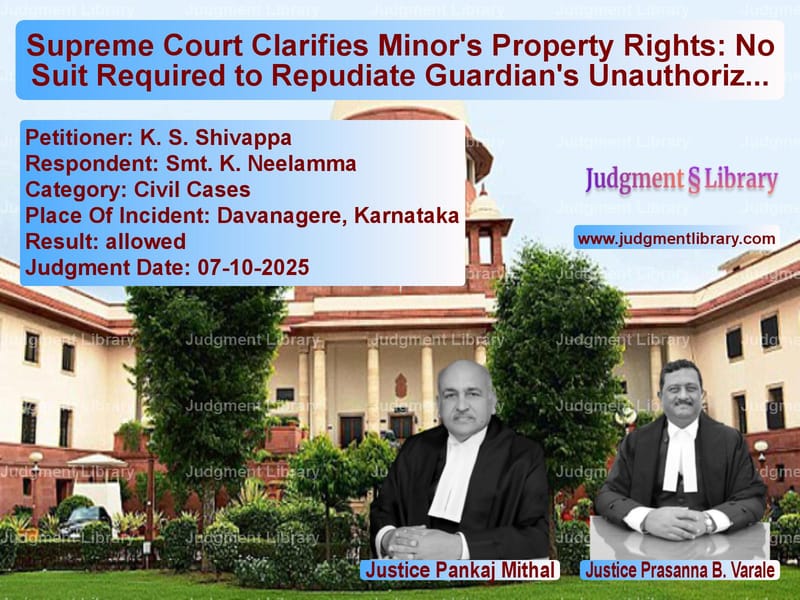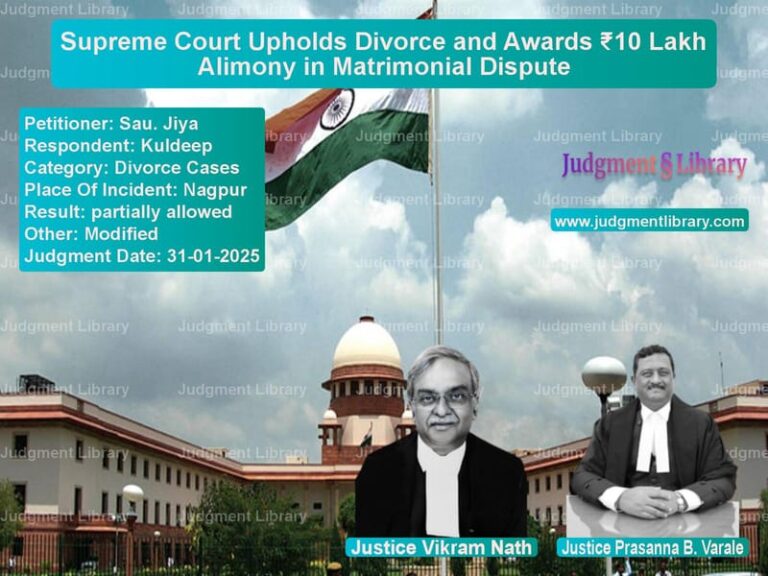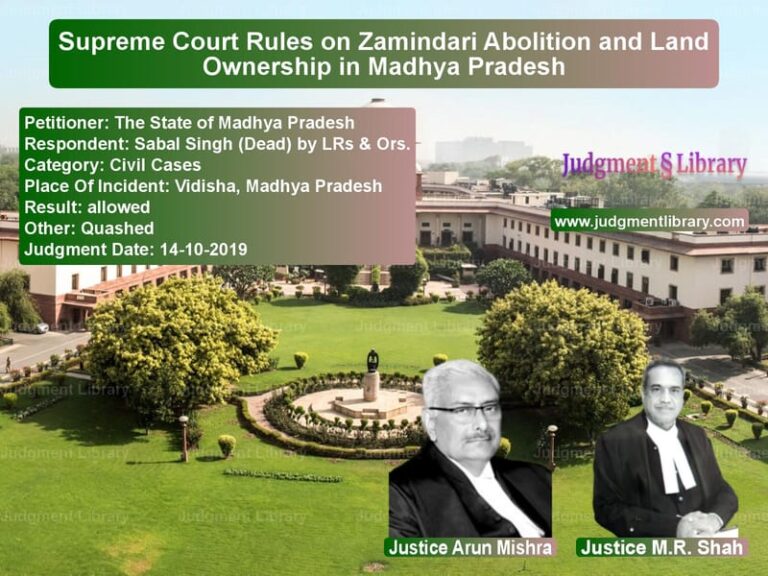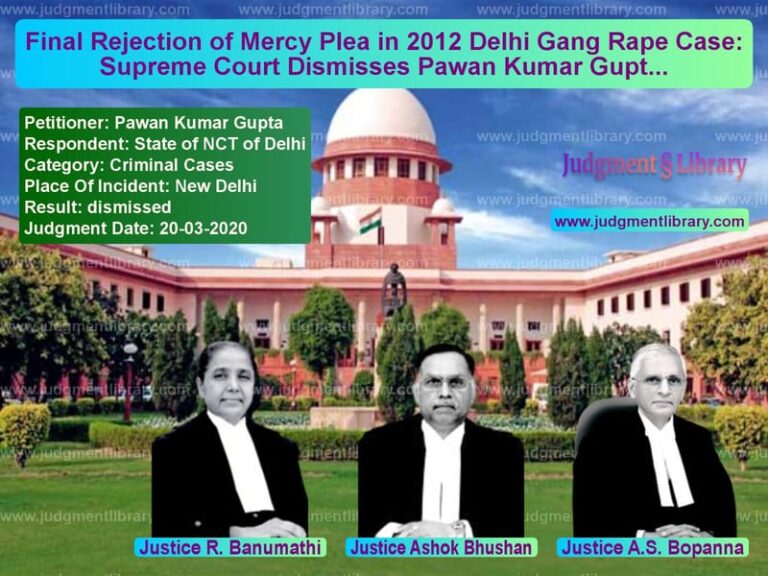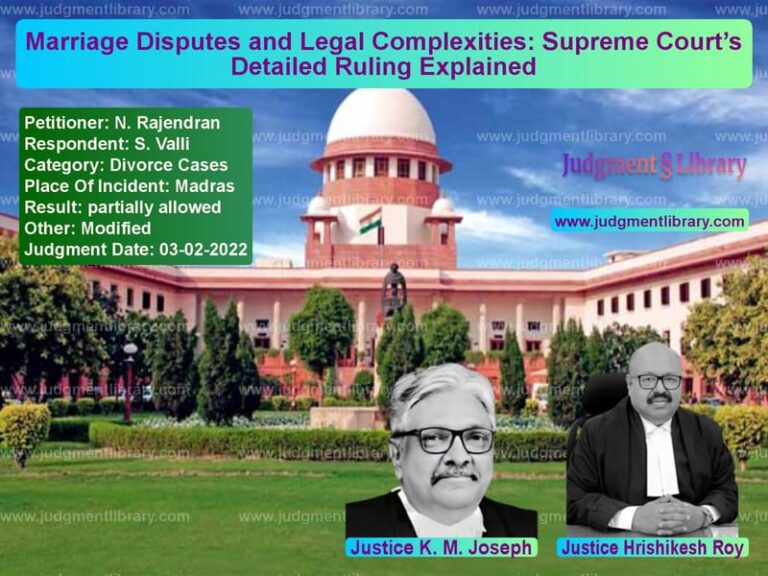Supreme Court Clarifies Minor’s Property Rights: No Suit Required to Repudiate Guardian’s Unauthorized Sale
In a landmark judgment that brings significant clarity to property rights of minors, the Supreme Court of India has ruled that minors who attain majority are not required to file a formal lawsuit to repudiate unauthorized property sales made by their guardians. The court held that such repudiation can be effectively communicated through unequivocal conduct, including transferring the property to a third party within the limitation period.
The case involved a complex property dispute spanning several decades, centered around two plots originally owned by three minor brothers. Their father, acting as natural guardian, had sold both plots without obtaining the mandatory court permission required under the Hindu Minority and Guardianship Act. When the minors attained majority, they sold the same properties to another purchaser, leading to competing claims and multiple lawsuits.
The Property Dispute Background
The legal saga began when Mahadevappa owned two sites measuring 42 ft. x 30 ft. and 41 ½ ft. x 30 ft., described as plots Nos. 56 and 57. These properties were purchased by Rudrappa in the name of his three minor sons – Maharudrappa, Basavaraj and Mungeshappa, making them joint owners of both plots.
Rudrappa, as the natural guardian of the minors, transferred plot No. 56 to S.I. Bidari through a registered sale deed without court permission. This property eventually changed hands multiple times. Similarly, plot No. 57 was sold to Krishnoji Rao, again without the required court approval.
The crucial turning point came when the surviving minors (one had died) attained majority. Within the prescribed limitation period, they along with their mother sold both plots to K.S. Shivappa. Shivappa then clubbed both properties and built a house to live in, believing he had acquired valid title.
This led to legal battles from both sides. For plot No. 57, Smt. K. Neelamma, who had purchased it from Krishnoji Rao, filed a suit against Shivappa claiming ownership. The trial court dismissed her suit, but the first appellate court and later the High Court ruled in her favor, creating the conflict that ultimately reached the Supreme Court.
The Legal Question
The Supreme Court framed the central legal question as: “whether it is necessary for the minors to have filed a suit upon attaining majority within the prescribed time period, to set aside the earlier sale deed executed by their natural guardian, with respect to plot no.57 or such a sale deed could be repudiated through their conduct within three years of attaining majority.”
This question required the court to interpret Section 8 of the Hindu Minority and Guardianship Act, 1956, particularly sub-sections (2) and (3), which govern the powers of natural guardians over minor’s property.
Court’s Analysis of Legal Provisions
The court meticulously examined Section 8 of the Act, noting that “a natural guardian of a minor has no authority in law to mortgage, sell, gift or otherwise transfer any part of the immovable property of the minor or even to lease out any part of such property for a term exceeding five years or for a term extending more than one year beyond the date on which the minor will attain majority without the prior permission of the court.”
The court emphasized that “prior permission of the court is a sine qua non for a guardian of a minor to transfer the property of the minor in any of the manners provided under sub-Section (2) of Section 8 of the Act.”
Regarding sub-section (3), the court observed that it “in unequivocal terms provides that the disposal of any immovable property by the natural guardian in contravention of sub-Section (1) or sub-Section (2) is voidable at the instance of the minor or any person claiming under him.”
The court noted that while the Act makes such transactions voidable, it “nowhere categorically provide the manner in which such a transaction of disposal of the property of a minor by a guardian without the permission of the court would be a voidable.”
Historical and Jurisprudential Support
The judgment drew support from various legal authorities and precedents. The court cited Travellyan’s well-known book on Minors, which states: “A transaction which is voidable at the instance of the minor may be repudiated by any act or omission of the late minor, by which he intends to communicate the repudiation, or which has the effect of repudiating it, for instance, a transfer of land by him avoids a transfer of the same land made by his guardian before he attained the age of majority. It is not necessary that he should bring a suit.”
Similarly, Mulla’s Hindu Law was referenced, observing that “An alienation made by a Hindu widow without legal necessity and without the consent of the next reversioners is voidable at their option. They may affirm it, or treat it as a nullity without the intervention of a court.”
The court also examined several judicial precedents, including the century-old case of Abdul Rahman vs. Sukhdayal Singh, where “the court observed that it is not necessary that a suit should be instituted to set aside the lease which was executed by the guardian of the minor and that the act of the minor of selling the property on attaining majority is enough to repudiate the lease deed.”
In Chacko Mathew v. Ayyappan Kutty, the court had held: “It is not always necessary that a party entitled to avoid a transaction not binding on him should sue for its rescission. He can himself avoid it by an unequivocal act repudiating it.”
Supreme Court Precedents
The judgment extensively discussed previous Supreme Court decisions on the subject. In Madhegouda vs Ankegouda, this Court had held: “The minor, on attaining majority, can repudiate the transfer in any manner as and when occasion for it arises. After attaining majority if he/she transfers his/her interest in the property in a lawful manner asserting his/her title to the same that is sufficient to show that the minor has repudiated the transfer made by the de facto guardian/manager.”
In G. Annamalai Pillai vs District Revenue Officer and Ors., the Court had quoted Salmond on Jurisprudence: “A voidable agreement stands midway between these two cases. It is not a nullity, but its operation is conditional and not absolute. By reason of some defect in its origin it is liable to be destroyed or cancelled at the option of one of the parties to it. On the exercise of this power the agreement not only ceases to have any efficacy but is deemed to have been void ab initio. The avoidance of it relates back to the making of it.”
The court in that case had further stated that “when the respondent avoided the lease deed executed by his father, the lease became void from its inception and no statutory rights could therefore accrue in favour of the other party.”
Application to the Present Case
Applying these principles to the facts, the court found that “undisputedly the surviving minors on attainment of majority had repudiated the transaction of sale executed by their father by entering into a fresh contract of sale of the property in question.”
The court noted several important factors: “It is admitted on record that on the basis of the sale deed executed by the father of the minors, the purchaser or the subsequent purchasers have not entered into possession and the name of the minors continued to appear in the revenue records. There is no material on record that the minors had the knowledge of the execution of the sale deed by their father.”
In these circumstances, the court held that “if they have avoided the sale executed by their father on attaining majority, it is sufficient repudiation of the said sale and it was not necessary for them to have instituted the suit for the cancellation of such a sale rather the purchasers of the property of the minors through the guardian on acquiring knowledge of the sale executed by the minors on attaining majority ought to have instituted a suit either for the cancellation of the sale deed executed by the minors or for declaration of their right, title and interest in the property.”
Additional Grounds Supporting the Decision
The court identified another significant issue favoring K.S. Shivappa – the failure of Smt. K. Neelamma to properly prove her case. The court noted that “the plaintiff, Smt. K. Neelamma in instituting the original suit in the plaint simply pleaded that she had purchased the property vide registered sale deed dated 17.12.1993 for a valuable consideration from Krishnoji Rao. She has nowhere stated or pleaded that she had verified the title of the vendor or that the vendor, Krishnoji Rao, was having a valid title over the property so as to transfer it in her favour.”
More critically, “the aforesaid plaintiff, Smt. K. Neelamma had not entered the witness box to prove her plaint case or to assert her title over the suit property. She had not even proved the sale deed dated 17.12.1993 under which she has allegedly purchased the suit land from Krishnoji Rao or to state that Krishnoji Rao was having a valid title over the said land to transfer her.”
The court emphasized that “the power-of-attorney holder of the plaintiff, Smt. K. Neelamma namely Shivaji Rao Salanki, PW-1 was not competent to depose or to prove anything which was not within his personal knowledge or was otherwise personally known to the plaintiff.” Citing Janki Vashdeo Bhojwani vs. Industnd Bank Ltd., the court reaffirmed that “where the plaintiff refuses to testify, the proxies cannot substitute his personal testimony on key issues within the personal knowledge of the plaintiff. A Power-of-Attorney holder is thus, not entitled to depose in place of the principal.”
Conclusion and Impact
The Supreme Court conclusively held that “it is not always necessary for a minor to institute a suit for cancellation of a voidable sale transaction executed by his guardian on attaining majority within the limitation provided and that such a transaction can be avoided or repudiated by his conduct.”
This judgment significantly clarifies the law regarding minor’s property rights and the procedure for repudiating unauthorized transactions by guardians. It recognizes the practical difficulties minors might face in filing lawsuits and provides a more accessible means of protecting their property rights through clear, unequivocal conduct.
The court allowed the appeal, set aside the judgments of the High Court and First Appellate Court, and restored the trial court’s decree in favor of K.S. Shivappa. This decision not only resolves the specific property dispute but also establishes an important precedent that will guide similar cases in the future, ensuring that the property rights of minors are adequately protected without imposing impractical legal formalities.
Petitioner Name: K. S. Shivappa.Respondent Name: Smt. K. Neelamma.Judgment By: Justice Pankaj Mithal, Justice Prasanna B. Varale.Place Of Incident: Davanagere, Karnataka.Judgment Date: 07-10-2025.Result: allowed.
Don’t miss out on the full details! Download the complete judgment in PDF format below and gain valuable insights instantly!
Download Judgment: k.-s.-shivappa-vs-smt.-k.-neelamma-supreme-court-of-india-judgment-dated-07-10-2025.pdf
Directly Download Judgment: Directly download this Judgment
See all petitions in Property Disputes
See all petitions in Succession and Wills
See all petitions in Contract Disputes
See all petitions in Judgment by Pankaj Mithal
See all petitions in Judgment by Prasanna Bhalachandra Varale
See all petitions in allowed
See all petitions in supreme court of India judgments October 2025
See all petitions in 2025 judgments
See all posts in Civil Cases Category
See all allowed petitions in Civil Cases Category
See all Dismissed petitions in Civil Cases Category
See all partially allowed petitions in Civil Cases Category

